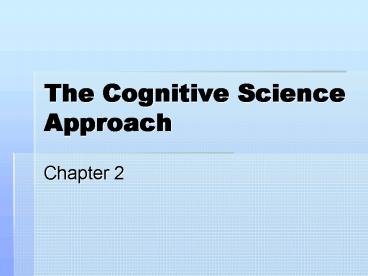The Cognitive Science Approach PowerPoint PPT Presentation
1 / 26
Title: The Cognitive Science Approach
1
The Cognitive Science Approach
- Chapter 2
2
To Do List
- Research Methods
- The Information Processing Approach
- The Modern Cognitive Approach
- Brain and Cognition
3
Research Methods
- Reaction Time
- Cognitive processes take time
- 12 10
- 46 59
- Accuracy (error rates)
- Tell us how information was being processed
- Verbal Protocols
- Verbalize thoughts as solve problems
- Neuroimaging
4
Reaction Time
5
Research Methods
- Reaction Time (RT)
- The time elapsed between some stimulus and the
persons response to the stimulus - Typically measured in milliseconds (ms)
- 1000 milliseconds 1 second
6
Research Methods
- Accuracy Measures
- How many errors a subject makes
- Which are recalled correctly and which are not
- Types of errors
- e.g., KLXCRN ? KLXTRN
- Measured as proportion or correct
7
Information Processing Approach
- The coordinated operation of active mental
processes within a multicomponent memory system - General model for memory and cognitive systems
- For many years was cognitive psychologys guide
for research - Where to start
- What to look for
- What to be aware of
8
The Standard Theory of Information Processing
9
The Standard Theory of Information Processing
- Atkinson Shiffrin (1968, 1971)
- Three memory components
- Sensory Memory
- Bring information from the environment to STM
- Short-Term Memory
- To/from LTM output
- Long-Term Memory
- Each step takes time
- Fixed order
- One at a time
10
Lexical Decision Task(Word/Non-word RT Task)
- YES or NO, do the following letter strings form
valid English words? - 1) House
- 2) Glorp
- What are the mental steps/ stages involved in
answering these questions?
11
The Standard Theory of Information Processing
12
Lexical Decision Task
- Encoding the stimulus
- Take in information and convert to a useable
mental form - Looking up the word in your internal dictionary
- LTM retrieval
- Deciding if it is a word or non-word
- STM
- Making a motor response
- STM
13
A Process Model of the Lexical Decision Task
14
Lexical Decision Task
- How do the RTs compare for
- Words vs. Non-words
- Frequent vs. Infrequent words
- Which stage of the Process Model?
- Word Frequency Effect
- What does this tell us about how words are
stored? (50 ms difference) - Pronounceable vs. Illegal non-words
15
Information Processing Approach
- Any task consists of a number of stages
- Stages are completed in order
- Information passes from one stage to another
- Sequential stages
- Independent and non-overlapping stages of
processing - One stage finishes before the next begins
16
Whats Wrong with Information Processing
- Parallel Processing
- Multiple processes happen simultaneously (in
parallel) - Your mind can do two things at once
- e.g., typing
- While one letter is being typed, another is being
translated into a movement and the input stage is
encoding up coming letters (as many as 8 letters
in advance!)
17
Whats Wrong with Information Processing
- Context Effects
- Process ROBIN faster if saw recently or were
discussing birds recently - Why it can be difficult to recognize someone out
of context - Everyday example
18
Top-Down Processing or Conceptually-Driven
Processing
- When the existing context has an influence on
mental processes - In the example, reading is so automatic that
youve learned to only pay attention to content
words and ignore function words like of - Most people say 3 ? really there are 6!
19
Whats Wrong with Information Processing
- Not useful for studying complex cognition
- e.g., problem solving tasks
- Over reliance on RT measures
- Make inferences about mental processes just by
having someone press buttons - What about accuracy and verbal protocols which
are important for more complex tasks
20
Whats Wrong with Information Processing
- Was a good start
- Provided a testable model for how cognitive
processes operate - Dominant view in cognitive psychology until the
mid-1970s - Now use a broader, less restrictive approach ?
cognitive science
21
Updating the Theory (Neisser,
1976)
22
Updating the Theory (Neisser,
1976)
- Parallel Processing triangle
- Different components can oporate simultaneously
- Context Effects bidirectional arrows
- Information in LTM can influence SM
- e.g., did you notice my spelling mistake above?
- Attentional Mechanism
- Open to a variety of research techniques
23
Brain and Cognition
- We can study cognitive processes by studying the
brain - The goal is to understand (not how the brain
works) what the brain can tell us about how
cognitive functions work - Two approaches ?
24
Brain and Cognition
- Cognitive Neuropsychology
- Analysis of those handicaps in human cognitive
function which result from brain injury - K.C. motorcycle accident ? no ability to
remember anything from his past (playing chess
with someone last week) but still remembers facts
(e.g., how to play chess, who is the President) - Dissociation a disruption in one component of
memory but no impairment of another - What does this tell us about memory?
25
Brain and Cognition
- Brain Imaging
- Are different brain areas active when you
- read apple
- see an apple
- imagine an apple
26
Coglab
- www.coglab.wadsworth.com
- Students
- Access Your Account
- Logging on
- IDs and passwords
- Registration E-Pin
- User Information Name Password
- The experiments

